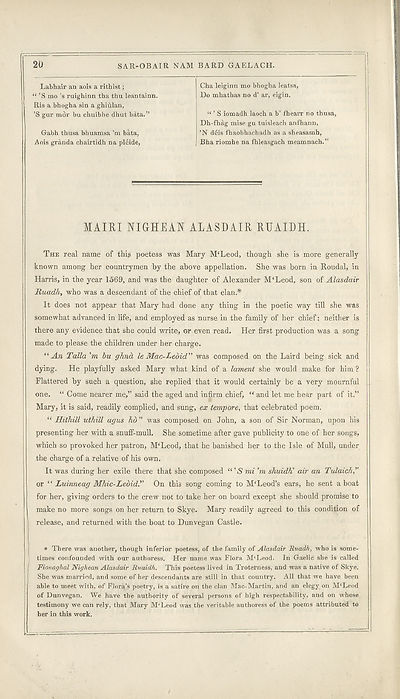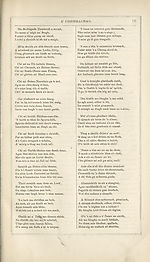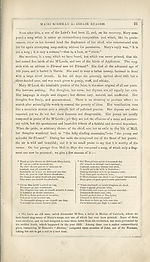Books and other items printed in Gaelic from 1871 to 1900 > Sar-obair nam bard Gaelach, or, The beauties of Gaelic poetry, and lives of the Highland bards
(100) Page 20
Download files
Complete book:
Individual page:
Thumbnail gallery: Grid view | List view

20
SAR-OBAIR NAM BARD GAELACH.
Labhair an aois a rithist;
“ ’S mo’s ruighinn tha thu leantainn.
Ris a bhogha sin a ghiulan,
’S gur mor bu chuibhe dhut bata.”
Cha leiginn mo bhogha leatsa,
Do mhathas no d’ ar, eigin.
Gabh thusa bhuamsa ’m bata,
Aois granda chairtidh na pleide,
“ ’ S iomadh laoch a b’ fhearr no thusa,
Dh-fhag mise gu tuisleach anfhann,
’N deis fhaobhachadh as a sheasamh,
Bha riomhe na fhleasgach meamnach.”
MAIRI NIGHEAN ALASDAIR RUAIDH.
The real name of thig poetess was Mary M'Leod, though she is more generally
known among her countrymen by the above appellation. She was born in Roudal, in
Harris, in the year 1569, and was the daughter of Alexander M'Leod, son of Alasdair
Huadh, who was a descendant of the chief of that clan.*
It does not appear that Mary had done any thing in the poetic way till she was
somewhat advanced in life, and employed as nurse in the family of her chief: neither is
there any evidence that she could write, or even read. Her first production was a song
made to please the children under her charge.
“ Mre Talla'm bu ghnd le Mac-Ledid" was composed on the Laird being sick and
dying. He playfully asked Mary what kind of a lament she would make for him ?
Flattered by such a question, she replied that it would certainly be a very mournful
one. “ Come nearer me,” said the aged and infirm chief, “ and let me hear part of it.”
Mary, it is said, readily complied, and sung, ex tempore, that celebrated poem.
“ Hithill uthill agus hd” was composed on John, a son of Sir Norman, upon his
presenting her with a snuff-mull. She sometime after gave publicity to one of her songs,
which so provoked her patron, M‘Leod, that he banished her to the Isle of Mull, under
the charge of a relative of his own.
It was during her exile there that she composed “'S mi'm shuidh’ air an Tulaich,"
or “ Luinneag Mhic-Ledid.” On this song coming to MfLeod’s ears, he sent a boat
for her, giving orders to the crew not to take her on board except she should promise to
make no more songs on her return to Skye. Mary readily agreed to this condition of
release, and returned with the boat to Dunvegan Castle.
* There was another, though inferior poetess, of the family of Alasdair Ruadh, who is some¬
times confounded with our authoress. Her name was Flora M‘Leod. In Gaelic she is called
Fionaghal Nighean Alasdair Ruaidh. This poetess lived in Troterness, and was a native of Skye.
She was married, and some of her descendants are still in that country. All that we have been
able to meet with, of Florals poetry, is a satire on the clan Mac-Martin, and an elegy on M‘Leod
of Dunvegan. We have the authority of several persons of high respectability, and on whose
testimony we can rely, that Mary M‘Leod was the veritable authoress of the poems attributed to
her in this work.
SAR-OBAIR NAM BARD GAELACH.
Labhair an aois a rithist;
“ ’S mo’s ruighinn tha thu leantainn.
Ris a bhogha sin a ghiulan,
’S gur mor bu chuibhe dhut bata.”
Cha leiginn mo bhogha leatsa,
Do mhathas no d’ ar, eigin.
Gabh thusa bhuamsa ’m bata,
Aois granda chairtidh na pleide,
“ ’ S iomadh laoch a b’ fhearr no thusa,
Dh-fhag mise gu tuisleach anfhann,
’N deis fhaobhachadh as a sheasamh,
Bha riomhe na fhleasgach meamnach.”
MAIRI NIGHEAN ALASDAIR RUAIDH.
The real name of thig poetess was Mary M'Leod, though she is more generally
known among her countrymen by the above appellation. She was born in Roudal, in
Harris, in the year 1569, and was the daughter of Alexander M'Leod, son of Alasdair
Huadh, who was a descendant of the chief of that clan.*
It does not appear that Mary had done any thing in the poetic way till she was
somewhat advanced in life, and employed as nurse in the family of her chief: neither is
there any evidence that she could write, or even read. Her first production was a song
made to please the children under her charge.
“ Mre Talla'm bu ghnd le Mac-Ledid" was composed on the Laird being sick and
dying. He playfully asked Mary what kind of a lament she would make for him ?
Flattered by such a question, she replied that it would certainly be a very mournful
one. “ Come nearer me,” said the aged and infirm chief, “ and let me hear part of it.”
Mary, it is said, readily complied, and sung, ex tempore, that celebrated poem.
“ Hithill uthill agus hd” was composed on John, a son of Sir Norman, upon his
presenting her with a snuff-mull. She sometime after gave publicity to one of her songs,
which so provoked her patron, M‘Leod, that he banished her to the Isle of Mull, under
the charge of a relative of his own.
It was during her exile there that she composed “'S mi'm shuidh’ air an Tulaich,"
or “ Luinneag Mhic-Ledid.” On this song coming to MfLeod’s ears, he sent a boat
for her, giving orders to the crew not to take her on board except she should promise to
make no more songs on her return to Skye. Mary readily agreed to this condition of
release, and returned with the boat to Dunvegan Castle.
* There was another, though inferior poetess, of the family of Alasdair Ruadh, who is some¬
times confounded with our authoress. Her name was Flora M‘Leod. In Gaelic she is called
Fionaghal Nighean Alasdair Ruaidh. This poetess lived in Troterness, and was a native of Skye.
She was married, and some of her descendants are still in that country. All that we have been
able to meet with, of Florals poetry, is a satire on the clan Mac-Martin, and an elegy on M‘Leod
of Dunvegan. We have the authority of several persons of high respectability, and on whose
testimony we can rely, that Mary M‘Leod was the veritable authoress of the poems attributed to
her in this work.
Set display mode to:
![]() Universal Viewer |
Universal Viewer | ![]() Mirador |
Large image | Transcription
Mirador |
Large image | Transcription
Images and transcriptions on this page, including medium image downloads, may be used under the Creative Commons Attribution 4.0 International Licence unless otherwise stated. ![]()
| Permanent URL | https://digital.nls.uk/109810273 |
|---|
| Description | Out-of-copyright books printed in Gaelic between 1631 and 1900. Also some pamphlets and chapbooks. Includes poetry and songs, religious books such as catechisms and hymns, and different editions of the Bible and the Psalms. Also includes the second book ever published in Gaelic in 1631. |
|---|

